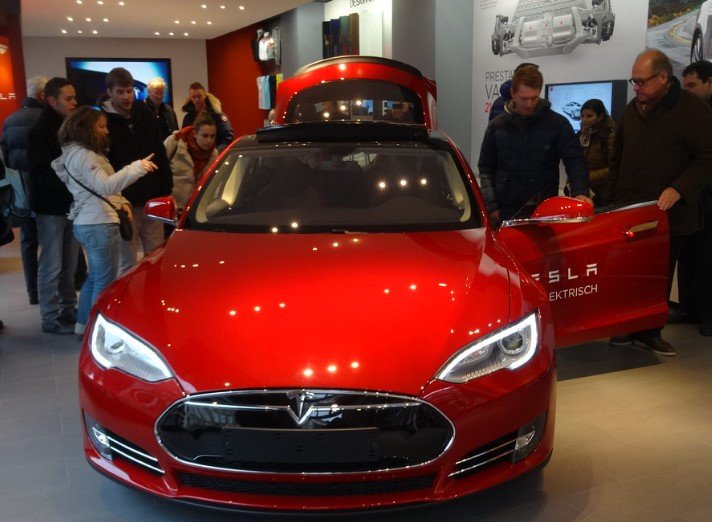Tesla, the electric vehicle giant, has made it clear it’s not planning to build factories in India anytime soon, despite earlier signals. Union Heavy Industries Minister H.D. Kumaraswamy confirmed on Monday that Tesla is only interested in opening a couple of stores, not manufacturing units, in the country.
This stance comes even as other global carmakers like Mercedes-Benz, Volkswagen-Škoda, Hyundai, and Kia are keen to jump on the Indian government’s ambitious plan to boost electric vehicle production. The government’s Scheme to Promote Manufacturing of Electric Passenger Cars, launched last year, aims to bring big investments and create a domestic EV industry. But Tesla seems to be taking a pass on this opportunity—for now, at least.
India’s EV Dream Hits a Bump with Tesla’s Withdrawal
When Tesla first announced job openings in India earlier this year, many thought the company was warming up to a serious market entry. The jobs ranged from store managers to customer engagement roles, hinting at an expanding footprint. Yet, Kumaraswamy’s recent remarks make it clear Tesla’s ambitions stop short of manufacturing here.
It’s a big deal because Tesla’s presence in India could potentially shake up the fledgling EV market. India wants to become a global hub for electric vehicle manufacturing, hoping to tap into demand both at home and abroad. The government has set strict rules: companies must invest at least Rs 4,150 crore (about $500 million) and meet defined domestic value addition targets to qualify for incentives.

Tesla’s decision might stem from the high costs and complexities involved. Building factories isn’t cheap, and navigating India’s regulatory environment can be tricky. Plus, the company may prefer to play it safe by focusing on sales and brand building first.
Meanwhile, other manufacturers are showing more enthusiasm. Hyundai and Kia have already made waves with affordable electric models that appeal to Indian buyers. Volkswagen and Mercedes-Benz are also eyeing the market, ready to tap government support under the new scheme. They’re betting on the growing demand for cleaner transportation options and India’s push for sustainability.
Trump’s Throwback Complaints and International Tensions
This isn’t Tesla’s first challenge on the India front. Back in February, former U.S. President Donald Trump publicly criticized Tesla’s plan to expand into India, labeling it “unfair” to the U.S. He argued that if Tesla built factories abroad—like in India—it would harm American manufacturing jobs.
Trump’s objections weren’t just about Tesla; Apple and other big American tech companies faced similar pushback from his administration when they looked to expand overseas. This tangled web of international trade tensions and politics sometimes complicates decisions for companies like Tesla, which operate on a global scale.
Still, India remains a tempting market. The sheer size of its population, growing middle class, and government incentives make it one of the world’s hottest spots for EV growth. But Tesla’s current move suggests it’s proceeding with caution, perhaps waiting for a clearer path or better conditions.
What the New EV Manufacturing Scheme Means for India
The Indian government isn’t sitting still. On the same day Kumaraswamy spoke, the Heavy Industries Ministry rolled out fresh guidelines for its EV manufacturing scheme. The program is designed to attract big players willing to commit serious investment and help build a local supply chain.
The goal? To kickstart India’s own EV industry and reduce reliance on imports. This fits into Prime Minister Narendra Modi’s broader vision of a “Make in India” economy, with a focus on clean energy and sustainable growth.
The scheme’s tough requirements mean only serious players will jump in, and for now, Tesla isn’t among them. But given how fast the EV sector moves, this could change.
Why Tesla Might Be Holding Back
There are a few reasons Tesla might hesitate to manufacture in India:
-
High upfront costs – Setting up a factory in a new country isn’t cheap, especially with local sourcing rules.
-
Regulatory hurdles – India’s bureaucracy can be a maze, slowing down projects.
-
Market uncertainty – The EV market in India is still developing, and profit margins may not be attractive yet.
-
Alternative strategies – Tesla could be testing the waters with showrooms first, focusing on brand presence and sales before committing big.
One official involved in the scheme remarked, “Tesla’s approach is more cautious. They want to build demand first, then decide on manufacturing later.” This strategy isn’t unusual in the auto world, especially for high-tech brands entering emerging markets.
What’s Next for Tesla and India?
Tesla opening two stores is a start, but it’s a modest footprint compared to the company’s global ambitions. Still, those stores could pave the way for a stronger presence if market conditions improve.
India’s EV market is expected to grow exponentially over the next decade, driven by stricter emissions norms, cheaper batteries, and rising fuel prices. So, even if Tesla is holding back now, the future could look very different.
Until then, local players and other foreign manufacturers will continue their push. The race to dominate India’s EV market is heating up, and Tesla’s next move will be watched closely by investors, policymakers, and consumers alike.
One thing’s for sure: India’s EV story is just getting started. And while Tesla is on the sidelines for now, it’s a market that no automaker can afford to ignore for long.
